

April 2021 | Issue 233
Opinion structured credit
We have to think about the influence of social media like Reddit

Michelle Russell-Dowe
Head of securitised credit
Schroders
Born:
Connecticut
Lives:
split between downtown Manhattan and Hilton Head Island, South Carolina
Education:
Princeton University and Columbia University, Graduate School of Business
Hidden talent:
enjoys oil-painting, was a leading swimmer at university and can recite the alphabet backwards
Last holiday:
the Caribbean
Favourite movie:
A League of Their Own — it’s about persistence and camaraderie and has one of her favourite movie quotes: “There’s no crying in baseball”
Bucket list:
to go on the reality show Survivor. Russell-Dowe has practised starting a fire using just a flint and a machete.
Career:
started at Duff & Phelps rating mortgage-backed bonds and then moved to the buy side at Hyperion Capital Management in 1999 to become a portfolio manager. She has been part of the same team through two business sales — to Brookfield and then Schroders in 2016.Schroders:
traces its history to 1804 when it was founded by members of the Schroder family. Today it manages about $785 billion of assets.Q.
Which assets do you invest in?
A. We have a broad global mandate covering ABS, MBS, CLOs and the underlying assets, such as mortgages and receivables. We recently launched a $1.5 billion private credit fund, which follows a flexible best-ideas framework. It’s a relative value strategy so if we like an asset, we think about the best way to hold it. It might be through providing financing, buying the asset outright, or in securitised format.
Q.
What are the best and worst investments?A.
I look at the asymmetry of debt return profiles, and through that lens most bonds have an asymmetrically negative return profile. You buy at par and the best you can hope for is your coupon and par back.
As for the worst, we have a saying that for subordinated investments, par is never the right price. A low interest rate/low return environment has forced some investors to chase returns to the point where these credit bonds are again priced to perfection and, in our opinion, offer terrible risk-reward. Triple B-rated CMBS is an example.
Q.
What is the best trade you have made?
A.
One good trade does not really move the needle for a client. I remember the trades that are meaningful to my team. These are the threads that knit us together. One was a Bank of America Large Loan deal, which carried the ticker BALL. Without thinking I called out to our trader and asked if he had put his BALLs out for bid — it drew laughter across the office.
Q.
And the worst?A.
Early in my career, credit buying in MBS was focused on ‘money good’ at the expense of any other factor. Through a cycle, I learned that a bond might be money good, but that alone does not justify buying or holding it. The credit itself is important, but portfolio construction requires consideration of other factors.
Taking a myopic approach comes at the expense of liquidity and ignores volatility — and there is an opportunity cost to locking your money up in an illiquid bond. A liquidity premium assessment should consider the premium available in private markets. This kind of comparison is how we arrived at our best-ideas framework.
Q.
Where is the market heading?
A.
This is a cycle that has recovered at light speed. There has been so much fiscal and monetary support, which has insured against collateral damage and supported a paid recovery in financial markets. There are other unusual circumstances, with consumers being less easily able to consume, which has created excess savings. The potential revenge spending will colour the next 12 months. All the while, yields are low and duration is long, which means we are being paid less to take on more risk. It’s one of the reasons why my preference is to hold short-tenor bonds.
Q.
What needs to change about the way your industry does business?
A.
We need to focus less on what people say and more on what they do. There is a lot of talk on important topics, including diversity and ESG, but actions are critically important.Q.
Where do you see opportunities?
A.
The provision of capital and liquidity is likely to continue to evolve. We have to think about how people are going to have access to capital in the long term and the influence on public markets of social media like Reddit.
People want more of a say about how their money is used and the governance around that, so that is a tilt toward them having more influence. We could see an evolution where there is a larger shift toward private assets and the trading of forms of private debt.

Global credit funds & CLO's
April 2021
| Issue 233Published in London & New York.
Copyright Creditflux. All rights reserved. Check our Privacy Policy and our Terms of Use.


















